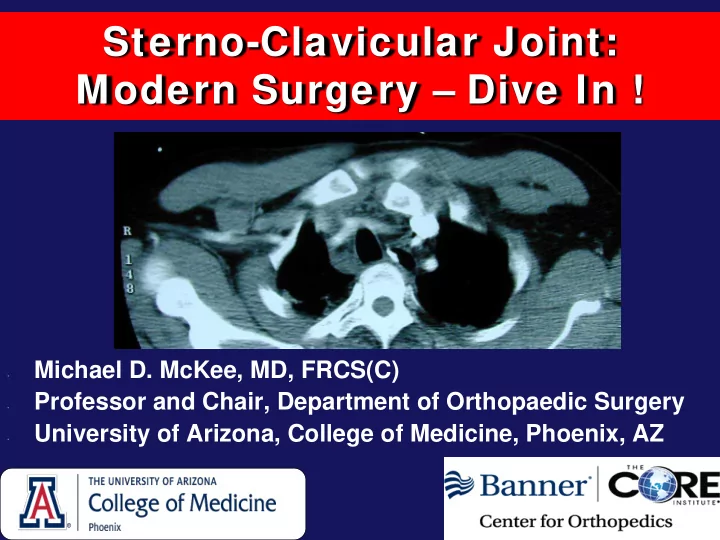

Sterno-Clavicular Joint: Modern Surgery – Dive In ! Michael D. McKee, MD, FRCS(C) • Professor and Chair, Department of Orthopaedic Surgery • University of Arizona, College of Medicine, Phoenix, AZ •
Disclosure • Studies supported by: - OTA, COA, ASES - Zimmer Inc. - Stryker, Olympus Biotech, AO • I am a consultant for Stryker, Acumed, Zimmer, ITS • Receive royalties from Stryker (plates), LWW, Springer (publishers)
Sterno-clavicular Injuries These injuries are classified by: Direction of the dislocation anterior or posterior Chronicity acute, sub-acute, or chronic Severity capsular sprains subluxations Dislocations Associated fractures
Traditional Treatment • What we said was that outcome was “ ….generally good….little disability…” if left alone • What we should have said was: this will be a problem for you but: – We are afraid to operate in this area – I never saw a case when I was training – We didn’t really have a reliable operation for SC instability
Treatment in 2017 Decide that you want to be the one doing this Closed Reduction – current standard of care – Reduction under local or general anesthesia – Patient Supine – 60% success anterior, 35% success posterior Open Reduction – If closed reduction fails, in appropriate cases – CV surgeon available
• 17 year old male, ATV accident
Semitendinosus graft in a figure-of-eight
I do not operate on the female adolescent with voluntary, atraumatic, subluxation or “clunking” of the SC joint Acute injuries with frank dislocations should be reduced Most subluxations can be treated non-operatively Closed reduction if possible, open reduction if necessary (I use plates and screws in general) with a CV surgeon available
Recommend
More recommend